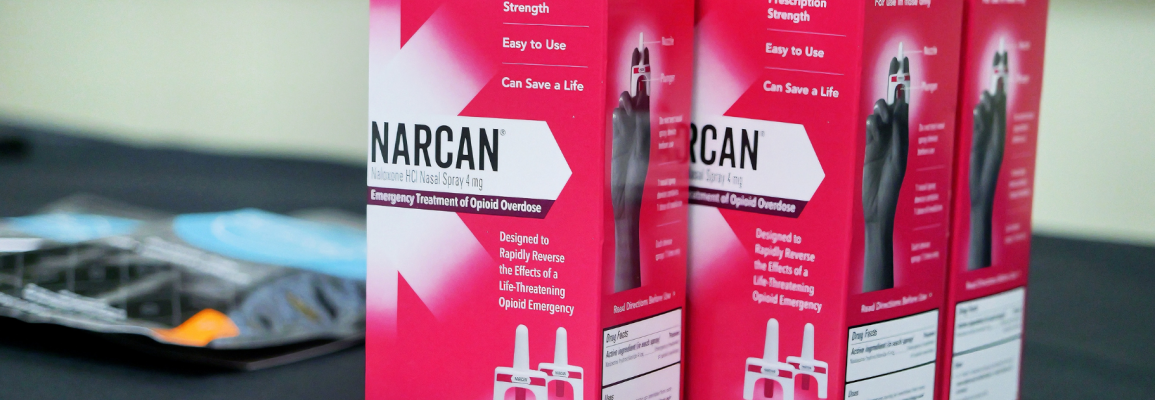Opioid overdose is life-threatening and requires immediate emergency attention. Recognizing the signs of an opioid overdose is essential to saving lives.
Signs and Symptoms of an Opioid Overdose
Opioid overdose is life-threatening and requires immediate emergency attention. Recognizing the signs of an opioid overdose is essential to saving lives.
- Their face is extremely pale and/or feels clammy to the touch
- Their body goes limp
- Their fingernails or lips change color (gray or ashen for people of color, and purple or blue for people who are white or have less melanin)
- They start vomiting or making gurgling noises (may sound like snoring)
- They cannot be awakened or are unable to speak
- Their breathing or heartbeat slows or stops
What to Do if You Suspect an Overdose
- Call 911
- Say, "I can't wake my friend up."
- Give addresses/location
- You don't need to tell the operator that drugs were taken or give your name if you don't want to
- Give Naloxone
- Perform rescue breathing if you feel comfortable
- Roll the person into the recovery position
- Stay with person
Naloxone/Narcan and Resources on Campus
What We Offer
Naloxone and fentanyl testing strips can be accessed in Wellness and Prevention Services at no cost. In North Carolina, students can anonymously gain access to Naloxone/Narcan and use it without consequence under the Good Samaritan Law and the Naloxone Access Law. The first step in assisting a peer having an opioid-related overdose is to call 911.
What is Naloxone?
Naloxone (also known as Narcan) is a life-saving medication that blocks opioid receptors in the nervous system, reversing an opioid-related overdose in an emergency. Opioids include but are not limited to heroin, fentanyl, and prescription/nonprescription opioid medications.
What are Fentanyl Testing Strips?
Fentanyl testing strips are a simple and inexpensive method of preventing drug overdose and reducing harm. They are small strips of paper that can detect the presence of fentanyl in a drug. Using this resource can empower individuals to make educated decisions about their safety.
Why We Do This Work
We believe students should have access to resources to protect themselves and others. The availability of these resources promotes the safety and well-being of students, reduces the risk of tragedy on and off campus, and reduces stigma. Students should feel comfortable assisting their peers during a possible overdose without worrying about repercussions.
How to Access Support on Campus
Stop by Wellness and Prevention Services on the ground floor of the Miles Annas Student Support building. We are located on the side of the building closest to Plemmons Student Union and are open weekdays from 8 a.m.–5 p.m. Simply ask for Narcan/naloxone or fentanyl testing strips (or both) at the reception desk, and we'll provide it, no questions asked. Wellness and Prevention Services staff does want to ensure an individual can effectively respond to an overdose and successfully use the resources, so brief, confidential training is available and encouraged.
Accessing resources through M.S. Shook Student Health Services.
Naloxone can be accessed at no cost, no questions asked in Student Health Services, located on the second floor of the Miles Annas building and open on Weekdays from 8 a.m.–4 p.m. (except Wednesday, opening at 9 a.m.) and weekends from 8–11 a.m. Walk-ins are welcome, and no prescription is necessary.
Seeking Recovery Resources?
App State's Mountaineer Recovery Community within Wellness and Prevention Services is here to assist in each individual's unique recovery by supporting pathways of recovery, preventing relapse, encouraging autonomy, providing support, increasing academic success, and offering a safe space on campus to process, grow, and reflect.
On-Campus Resources
M.S. Shook Student Health Service
Miles Annas Student Support Building
614 Howard St, Boone, NC 28608
(828) 262-3100
(828) 262-6958 (fax)
healthservice@appstate.edu
Monday – Tuesday: 8 a.m.–4 p.m.
Wednesday: 9 a.m.–4 p.m.
Thursday–Friday: 8 a.m.–4 p.m.
Saturday & Sunday: 8am – 11am
Wellness and Prevention Services
Miles Annas Student Support Building
614 Howard St, Boone, NC 28608
(828) 262-3148
(828) 262-8452 (fax)
wellness@appstate.edu
Monday – Friday: 8 a.m.–5 p.m.
Off-Campus Resources
Naloxone is available at these locations
Overdose Prevention Training
Teaching students, faculty, and staff overdose prevention strategies, signs and symptoms of an overdose and how to be an ally for individuals in recovery from addiction. Contact Jordan Kessler to schedule an in-person training.
